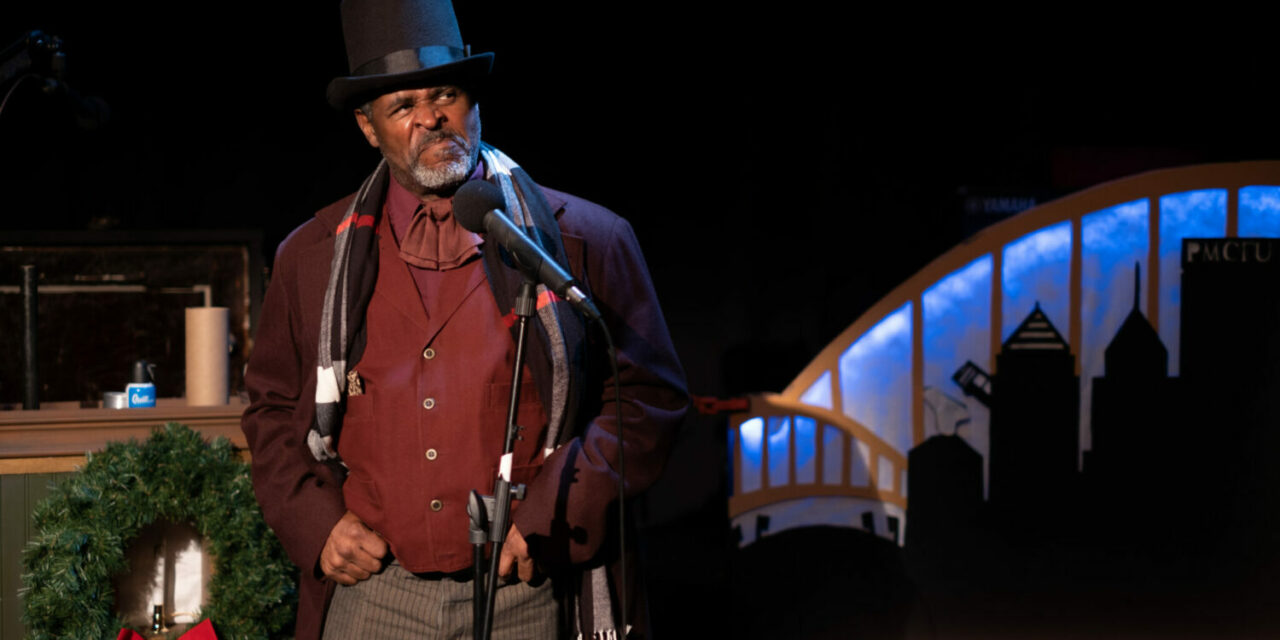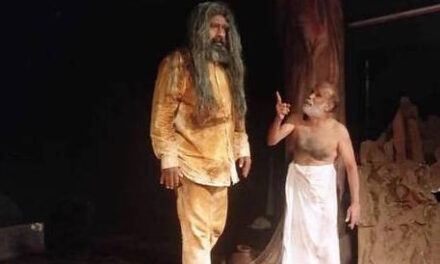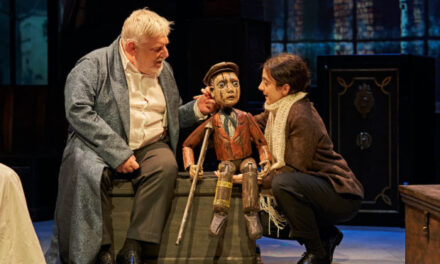Reader, if – like me – you’re a relatively recent transplant to Pittsburgh, the presence of the term “yinz” in the title of anything might immediately raise a question about your audience-ship, namely: “have I lived here long enough to understand the accent, let alone get the inside jokes?”
Have no fear along those lines with playwright Tami Dixon’s transplant of Dickens’s A Christmas Carol from 19thcentury London to the present day Steel(ers) City. The yinzer accents are thick, for sure – and the folks at Bricolage are old hands at milking the local dialect for laughs – but the humor and sentiment in their revival of Yinzer Scrooged: A Pittsburgh Christmas Carol are welcoming enough that even those relatively new to the ‘burgh will feel included in its gentle parody of local customs and history.
In Dixon’s reboot, Wali Jamal plays Jeffeneezer Scroogeoff, the haughty and mean-spirited CEO of a health insurance company known by the libel-evading acronym “PMCFU”; his night of ghostly visits is triggered after he callously rebuffs a generous invitation to Christmas dinner from one of his employees, Barbara Cratchett (Jaime Slavinsky), and her ailing son Tiny Tony (Connor McCanlus). Accompanying Scroogeoff on his journey of transformation and redemption are none other than famous Pittsburghers Andrew Carnegie and Fred Rogers (both played by Michael McBurney, the latter rather uncannily) along with quasi-hometown celebrity Lena Horne (the gorgeous-voiced Shammen McCune). Many local touches are strewn along the way – including a festive meal of ranch dressing-filled Pierogies (is that even a thing?) – but in general the bones of the story are familiar: after revisiting his past, re-viewing the present, and getting a glimpse of his desolate future, the miser Scroogeoff is brought to embrace the spirit of the season, engage in acts of generosity and compassion, and become a model citizen.

Shammen McCune. Photo by Handerson Gomes, courtesy of Bricolage Production Company.
All this is delivered in Bricolage’s signature cheeky “Midnight Radio” format, which layers a sheen of old-timey radio-play irony on top of Dixon’s already clever satirical writing. The actors – who also play a host of other characters in the play, including union protesters, hoity-toity one-percenters, and irritable food bank workers – all create foley sound effects at tables equipped with ingeniously repurposed objects, while light-up “On Air” and “Applause” signs cue the audience into our own role in the fiction that we are participants in a live studio broadcast. Dave Bielewicz’s scenic design brings a silhouette of the city, complete with yellow bridges, into the studio setting; lighting designer Jenna Ferree Robertson adds atmosphere and spookiness to the proceedings, particularly in the sequence led by the groaning, heavy-breathing Ghost of Christmas Future (a wheezing accordion, wielded by McBurney, helps bring this apparition to life). Musical Director Deana Muro kitted out in what looks like the regalia of every black-and-gold sports team ever to have graced a Pittsburgh field, provides seamless accompaniment on the keyboard, with music ranging from original composition to the familiar tag line from a certain locally produced PBS children’s show.
Dixon’s script is not only a lot of fun but also sharply observed: in this age of the ever-widening gap between rich and poor, Dickens’s social observations, filtered through local politics and culture, could not be more apposite. As such, waggish and impudent as Yinzer Scrooged may be, it lands in an unexpected place of real sentiment and emotion in the end, thanks largely to director Sam Turich’s sensitive shaping of the material and to the actors’ commitment to the core emotional journey of their characters. If a dose of “God Bless You, Everyone” is what you crave to get into the holiday spirit, you won’t be disappointed by the Bricolage team. Indeed, you might be surprised to find yourself with a tear or two in your eye, and it may or may not be of the laughing sort.
This article was originally posted in The Pittsburgh Tatler on 15 December 2019 and has been reposted with permission. To read the original article, click here.
This post was written by the author in their personal capacity.The opinions expressed in this article are the author’s own and do not reflect the view of The Theatre Times, their staff or collaborators.
This post was written by Wendy Arons.
The views expressed here belong to the author and do not necessarily reflect our views and opinions.


















